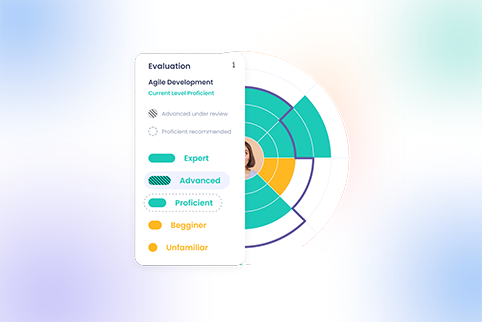How to Build a Company Culture Where Everyone Is Responsible and Accountable?
8 min read

Your company culture is an incredible tool you might use to enrich your people’s lives and improve organizational effectiveness. However, having a good, powerful corporate culture doesn’t guarantee immunity to challenges or failures (and the Covid-19 pandemic is a strong argument here).
On the other hand, it does predict some behaviors and ways of handling (difficult) cases and circumstances. Hence, the crucial part here is to maintain a flexible, growth mindset, being capable to respond with agility and resilience and adapt to the new situation.
Your company culture is an incredible tool you might use to enrich your people's lives and improve organizational effectiveness.
What are the first words coming to your mind when thinking of company culture? Most probably you’d think of commonly shared values, set of behaviours, (internal) rules and generally, the mindset shaping the way people work and interact.
How do you define culture?
Company culture thrives in diverse environments
Due to different perspectives, when seen and lived through the eyes of diversity, the company culture improves. It grows together with you, your business and last, but not least, your people. This is known as the edge effect, a term borrowed from ecology.
The beauty of having a team is the (cultural) diversity which brings lots of benefits: creativity, innovation, critical thinking, different perspectives and many more. Personality diversity, (cross) cultural diversity, different perspectives and opinions – you name it! All these are contributing and leaving a stamp on your workplace culture.
Your culture improves when different perspectives (seen and lived through the eyes of diversity) are invited to be openly expressed.
To culture fit or not?
Usually, the founders are the ones giving the tone to a company’s culture. They hire the first people in the team and they are the ones who encourage (or not) certain behaviours.
Hiring for culture fit is where everything begins. But with a twist. Stop looking for a perfect fit. Because you’ll be disappointed and it’s not even what you need and want. Instead, look for candidates who can add value and a new flavor to your existing culture and enrich it.
So spend some more time to analyze what really matters for this role? Where should the candidate fit in? And, on the other hand, what are the areas where you are flexible, giving the candidate the opportunity to freely contribute with a fresh mindset and perspectives?
And of course, you have your existing team. Your (current) foundation. They already share (some of) your values and encouraged behaviours. And they grow based on the direction the company goes, directly or indirectly contributing to the outcomes.
Be aware of the culture fit. But with a twist.
This article’s intention is to bring you some insights and starting points in building a culture where everyone feels responsible and accountable for its growth, richness and spread. We cannot promise you comprehensive and rigorous guidelines guaranteeing a 100% success in just one article, considering the fact that all company cultures are unique and need a personalized approach. However, here are some ideas that might guide you in building and (re)defining your company’s identity.
Start with your company values
Or principles. Or simple models of “how we do things around here” and make decisions (listen to Brené Brown’s podcast where she reveals hers and her team’s 5C’s model of encouraging deep thinking: context, color, connective tissue, cost and consequence). This is all about the way of working, behaviours, values. And this is all company culture.
There is no right or wrong way to determine what defines your culture. Therefore, you might use either values, or principles. Or both. Decide what’s easiest for you and your team to understand the process and identify what is really important and how you choose to handle the circumstances.
Company culture thrives when employees are involved
When defining your company’s values, involve your employees in the process. They will tell you the truth about your perception of what your company values are or are not. In other words, if you want to build a company culture where everyone is responsible and accountable for it, start by listening and involving your employees.
When defining your company's values, involve your employees in the process.
In case you, as a founder, have already identified several values you believe in (for your company), check your people’s perspective. See how you can ally together to use them as a guide when making a decision. And where you might need a fresh, holistic view of your employees. In this way, they will adopt your culture, fit in and feel like they belong to it.
For instance, let’s dive in into an example using our (Nestor’s) values (note your own list):
- Make our customers happy
- Delivering innovation through fast iterations
- Work as a team and communicate openly
- Self-Leadership
- Focus on results
Assess team’s perception of the company culture
Create a survey and assess how your people perceive and live these values during their daily activity. For example, it can be a Google form (or any other survey tool), an integrated tool such as Nestor, or it can also be an open session of brainstorming.
As a result, here are several questions we would use to assess our team’s perception of our identified values:
Questions set 1 – on “making our customers happy”
- How would you describe the experience we are delivering to our customers? What specific behaviour(s) or beliefs made this happen?
Questions set 2 – on “delivering innovation through fast iterations”
- In your eyes, how do we (as a team and company) address the challenges we are facing? How fast or how slowly do we react to challenges and opportunities? How do these behaviours differ or relate to your personal way of dealing with challenges?
Questions set 3 – on “working as a team and communicate openly”
- Please describe a situation in which you observed (or were part of) open communication and working as a team within our company. How do teams usually work and collaborate together? How is the responsibility shared? Last but not least, how is the feedback perceived and considered within our team?
Questions set 4 – on “self-leadership”
- How would you describe your teammates’ ability to lead themselves and take ownership? How ambitious and self-driven are your teammates? Give an example supporting your perception. How do your teammates approach learning and development? How do these behaviours, attitudes and beliefs differ or relate to your personal ability to lead yourself and take ownership of your own growth and work?
Questions set 5 – on “focus on results”
- How would you describe our decision making process? What are the main criteria we, as a team, are assessing the decisions we are making? How do you personally relate to these behaviours?
Questions set 6 – optional, on different perspectives
- Considering your experience within the team, describe by giving examples of specific situations when you felt most motivated, involved and aligned with company’s and team’s decisions, activities, values and way of working. When did you feel excited about being part of the team?
- In your eyes, what kind of behaviours reveal a true Nestorer teammate?
In conclusion, when designing the questions, think of how do you define those values or behaviours? And this should be the most valuable resource and foundation for asking the right questions.
Reiterate, reassess and encourage behaviors
In addition, once you identify and start living your company values, assess regularly how your people relate to these values (if they do so, of course).
Above all, your team will grow. You’ll bring on board new people and they will be able to embrace your culture at the level you (as a leader, as a teammate, as a company) will allow and support them with it.
In conclusion, create a favorable environment for your people to live your company’s values on a daily basis. And give them the opportunity and responsibility to make their own decisions. Subsequently, understand their way of thinking through and working. Guide your colleagues when needed, helping them become your culture ambassadors.
Final thoughts
Most importantly, everyone within the team, independently of their role and function, is responsible for company culture. Probably one of the most popular company cultures is the Netflix culture. In short, they identified what works for them. And many employees, professionals, HR experts, aficionados and CEOs have been inspired from Netflix’s workplace culture.
Some of them even started implementing some aspects in their own companies. In conclusion, everyone loves the Netflix culture and we can find a million reasons why. However, we’ll end this article with just one and therefore will leave you to draw your own conclusions:
| Netflix Vacations Policy and Tracking “There is no policy or tracking” There is also no clothing policy at Netflix, but no one comes to work naked. Lesson: you don’t need policies for everything. |
Culture is everyone’s responsibility. Therefore, to avoid the gap between the existing culture and desired culture, everyone within the company is responsible and accountable for cultivating the desired company culture. And this can be achieved by involving and inviting open-heartedly “different people and functions within the organization playing different roles in developing and maintaining the culture”.







